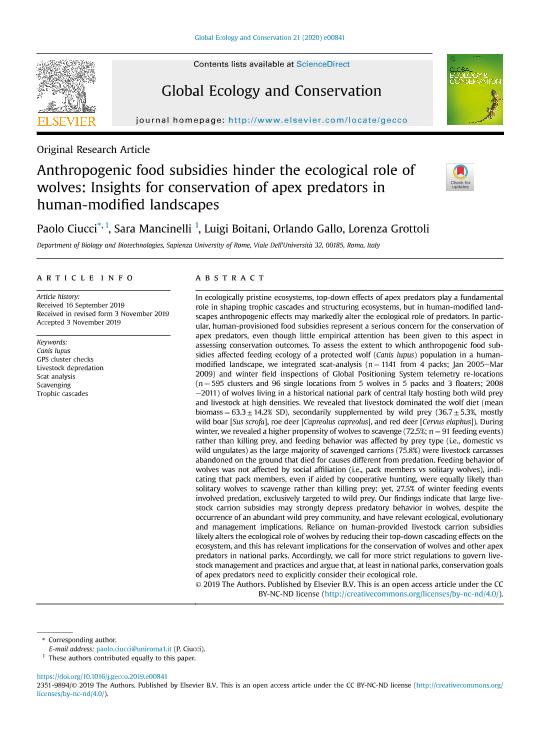Artículo
Anthropogenic food subsidies hinder the ecological role of wolves: insights for conservation of apex predators in human-modified landscapes
Fecha de publicación:
03/2020
Editorial:
Elsevier B.V.
Revista:
Global Ecology and Conservation
ISSN:
2351-9894
Idioma:
Inglés
Tipo de recurso:
Artículo publicado
Clasificación temática:
Resumen
In ecologically pristine ecosystems, top-down effects of apex predators play a fundamental role in shaping trophic cascades and structuring ecosystems, but in human-modified landscapes anthropogenic effects may markedly alter the ecological role of predators. In particular, human-provisioned food subsidies represent a serious concern for the conservation of apex predators, even though little empirical attention has been given to this aspect in assessing conservation outcomes. To assess the extent to which anthropogenic food subsidies affected feeding ecology of a protected wolf (Canis lupus) population in a human-modified landscape, we integrated scat-analysis (n = 1141 from 4 packs; Jan 2005–Mar 2009) and winter field inspections of Global Positioning System telemetry re-locations (n = 595 clusters and 96 single locations from 5 wolves in 5 packs and 3 floaters; 2008–2011) of wolves living in a historical national park of central Italy hosting both wild prey and livestock at high densities. We revealed that livestock dominated the wolf diet (mean biomass = 63.3 ± 14.2% SD), secondarily supplemented by wild prey (36.7 ± 5.3%, mostly wild boar [Sus scrofa], roe deer [Capreolus capreolus], and red deer [Cervus elaphus]). During winter, we revealed a higher propensity of wolves to scavenge (72.5%; n = 91 feeding events) rather than killing prey, and feeding behavior was affected by prey type (i.e., domestic vs wild ungulates) as the large majority of scavenged carrions (75.8%) were livestock carcasses abandoned on the ground that died for causes different from predation. Feeding behavior of wolves was not affected by social affiliation (i.e., pack members vs solitary wolves), indicating that pack members, even if aided by cooperative hunting, were equally likely than solitary wolves to scavenge rather than killing prey; yet, 27.5% of winter feeding events involved predation, exclusively targeted to wild prey. Our findings indicate that large livestock carrion subsidies may strongly depress predatory behavior in wolves, despite the occurrence of an abundant wild prey community, and have relevant ecological, evolutionary and management implications. Reliance on human-provided livestock carrion subsidies likely alters the ecological role of wolves by reducing their top-down cascading effects on the ecosystem, and this has relevant implications for the conservation of wolves and other apex predators in national parks. Accordingly, we call for more strict regulations to govern livestock management and practices and argue that, at least in national parks, conservation goals of apex predators need to explicitly consider their ecological role.
Archivos asociados
Licencia
Identificadores
Colecciones
Articulos(INBIOSUR)
Articulos de INSTITUTO DE CIENCIAS BIOLOGICAS Y BIOMEDICAS DEL SUR
Articulos de INSTITUTO DE CIENCIAS BIOLOGICAS Y BIOMEDICAS DEL SUR
Citación
Ciucci, Paolo; Mancinelli, Sara; Boitani, Luigi; Gallo, Orlando; Grottoli, Lorenza; Anthropogenic food subsidies hinder the ecological role of wolves: insights for conservation of apex predators in human-modified landscapes; Elsevier B.V.; Global Ecology and Conservation; 21; 3-2020; 1-14
Compartir
Altmétricas




